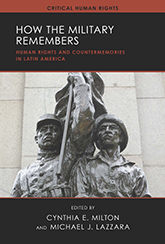|
How the Military Remembers
Human Rights and Countermemories in Latin America
Edited by Cynthia E. Milton and Michael J. Lazzara
Critical Human Rights
Scott Straus and Tyrell Haberkorn, Series Editors
Steve J. Stern, Series Editor Emeritus
“Examines how the militaries of Latin American countries confront truth commissions, memory sites, trials, and reparations. This book is indispensable for understanding the continent’s ongoing ‘memory wars.’”
—Emilio Crenzel, author of Memory of the Argentina Disappearances: The Political History of “Nunca Más”
What happens when perpetrators of violence distort how they narrate the past?
This groundbreaking collection of essays by experts in political science, sociology, history, and literature analyzes the nuanced and often contentious interplay between memory, truth, and accountability in contemporary Latin America. While previous studies have examined democratization efforts (and right-wing backlashes), transitional justice, and victim-oriented narratives since the end of the Cold War, this volume takes a new approach. It convincingly demonstrates the importance of deconstructing the militaries’ own active memory work—or rather countermemory work, a term the contributors employ to refer to military memories that are both counterintuitive and run counter to the “victim-oriented” memories that have historically informed Latin American public memory and human rights activism.
With an eye toward particular cultural, political, and historical contexts of the specific countries involved, the collection emphasizes the continuities that come into relief by taking a broader regional focus. The contributors identify the many subtle ways in which past military perpetrators appropriate mechanisms of accountability and truth-telling to reconfigure the past, muddy the distinctions between perpetrator and victim, and weaponize ways of remembering.
Cynthia E. Milton is a professor in the Department of History at the University of Victoria and a Fellow of the Royal Society of Canada. She is the author of Conflicted Memory: Military Cultural Interventions and the Human Rights Era in Peru and Art from a Fractured Past: Memory and Truth-Telling in Post–Shining Path Peru.
Michael J. Lazzara is a professor of Latin American literature and cultural studies in the Department of Spanish and Portuguese and the associate vice provost of academic programs and partnerships in Global Affairs at the University of California, Davis. His books include Civil Obedience: Complicity and Complacency in Chile Since Pinochet, Luz Arce and Pinochet’s Chile: Testimony in the Aftermath of State Violence, and Chile in Transition: The Poetics and Politics of Memory.
Praise
“A timely volume. The arguments and analysis offer original perspectives on complicated processes, and the study usefully expands upon foundational sources in the field of memory studies. This excellent text is essential reading.”
—Nancy Gates Madsen, author of Trauma, Taboo, and Truth-Telling: Listening to Silences in Postdictatorship Argentina
Table of Contents
List of Illustrations
Acknowledgments
List of Abbreviations
Introduction
Cynthia E. Milton and Michael J. Lazzara
PART I. Refashioning Military Men in Democracies
1 In the Name of the Father: Uncovering the Paternity of Military Memories of Dictatorship in Brazil
Rebecca Atencio
2 Fiction, Freedom, and Relativism: Human Rights in Pinochetista Memory in Post-Pinochet Chile (1998–2019)
Leith Passmore
3 Heroes and Genocidaires: Retired Officers of the Argentinian Army and Their Memories of the Recent Past
Valentina Salvi
4 Perpetrator Confessions and Discourses of Impunity in Post-transitional Uruguay: The Cases of Gavazzo and Tróccoli
Mariana Achugar and Gabriela Fried Amilivia
5 Military Narratives of Heroism and Sacrifice in War Crimes Trials in Guatemala
Jo-Marie Burt
PART II. Memorializing Military Memories
6 “The Hero of Joateca”: The Salvadoran Military’s Stubborn Memory of Domingo Monterrosa
Rachel Hatcher
7 Visualizing Soldiers as Victims: Kidnapping, and Photographic Proof of Survival in Colombia
Nicolás Rodríguez Idárraga
8 Captive to History: Military Memories and Censorship in Peruvian Public Spaces
Cynthia E. Milton
9 An Unorthodox Relationship: Colombia’s Public Forces and the National Center for Historical Memory (2012–2019)
María Emma Wills Obregón
PART III. Inheriting Military Pasts
10 The Challenges and Risks of Producing “Memory with History” Within the Peruvian Army
Carla Granados and Gladys Vásquez
11 Relatives of Perpetrators and Collaborators in Chile: Implicated Subjects, Memory, and Responsibility
Michael J. Lazzara
Contributors
Index
|

Larger images
July 2025
222 pp. 6 x 9
13 b/w illus.
|

